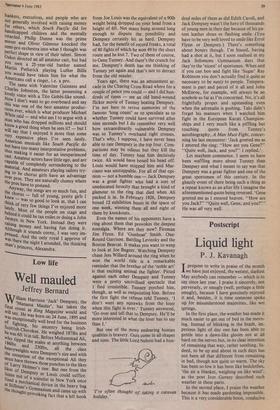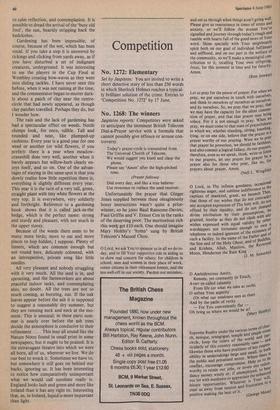Postscript
Liquid light
P. J. Kavanagh
Ipropose to write in praise of the month we have just enjoyed, the wettest, darkest May anybody can remember — which is to say since last year. I praise it sincerely, not perversely, or smugly (well, perhaps a little smugly), because I have genuinely enjoyed it and, besides, it is time someone spoke up for misunderstood majorities, like wet springs.
In the first place, the weather has made it much easier to get out of bed in the morn- ing. Instead of blinking in the brash, im- perious light of day one has been able to gentle into a dawn-like gloom not at all hard on the nerves but, in its clear intention of remaining that way, rather soothing. In- deed, to be up and about in such days has not been all that different from remaining in bed, though not quite so warm. The sky has been so low it has been like bedclothes, 'the air a blanket, weighing on like wool', as the poet Ivor Gurney described such weather in these parts.
In the second place, I praise the weather because it has made gardening impossible. This is a very considerable boon, conducive to calm reflection, and contemplation. It is possible to dread the arrival of the 'busy old fool', the sun, heartily stripping back the bedclothes.
Gardening has been impossible, of course, because of the wet, which has been vocal. If you take a step it is answered by tickings and clicking from yards away, as if you have disturbed a set of indignant creatures, underground. It was interesting to see the players in the Cup Final at Wembley creating bow-waves as they went into sliding tackles. I have never seen this before, when it was not raining at the time, and the commentator began to mutter dark- ly about a patch of clay near the centre- circle that had newly appeared, as though clay patches travelled. Perhaps they do, but I wonder how.
The rain and the lack of gardening has had a spectacular effect on weeds. Nettle clumps look, for once, edible. Tall and rounded and neat, like plumped-up cushions. Every year is a good year for one weed or another (or wild flowers, if you prefer): there is a year when meadow- cranesbill does very well, another when it barely appears but willow-herb clearly en- joys itself, and so on. One of the advan- tages of staying in the same spot is that you slowly realise how little repetition there is, everything is slightly different every year. This year it is the turn of a very tall, green, straight plant with tiny white flowers at the very top. It is everywhere, very soldierly and forthright. Reference to a gardening book shows that it is called jack-in-the hedge, which is the perfect name: strong and sturdy and pleasant, with not much in the upper storey.
Because of the weeds there seem to be many more birds; more to eat and more places to hop hidden, I suppose. Plenty of linnets, which are common enough but not round here, delicately coloured, with an introspective, private song like little needles.
All very pleasant and nobody struggling with it very much. All the seed is in, and sprouting, and the farmworkers are about peaceful indoor tasks, and contemplating also, no doubt. All the trees are not so much coming, as bursting, out. If the oak leaves appear before the ash it is supposed to suggest a reasonably dry summer, but they are running neck and neck at the mo- ment. This is unusual; in these parts sum- mer is nearly over before the ash trees decide the atmosphere is conducive to their refinement .... This may all sound like the Nature Notes found in small print in some newspapers, but it ought to be praised. It is the extravagant theatre into which we were all born, all of us, wherever we live. We do our best to wreck it. Sometimes we have to, but somewhere it still goes on behind our backs, ignoring us. It has been interesting to notice how comparatively unimportant what we would call sunshine really is. England looks lush and green and more like Ireland than it has any right to. Interesting that, as, in Ireland, liquid is more important than light.















































 Previous page
Previous page